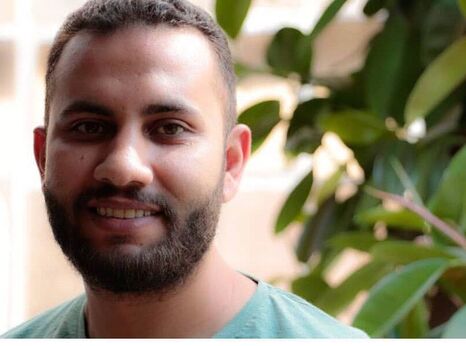Detained human rights defender's health at risk

Ibrahim is a researcher at the Egyptian Commission for Rights and Freedoms (ECRF), where he focuses on the right to housing.
Plain clothes police arrested Ibrahim on the night of 11 June 2019 from the street near his home in Cairo. The authorities concealed his fate and whereabouts for 167 days and denied having him in custody to his relatives and lawyers. On 26 November 2019, Ibrahim was brought before the Supreme State Security Prosecution (SSSP). According to his lawyer, he appeared physically weak and lost a considerable amount of weight. He told the prosecutor that he was tortured during his incommunicado detention to extract information about his relationship to the ECRF and about the organization’s work. He also complained about being held in inhumane and degrading conditions of detention, at several security agencies locations.
On 31 October 2020, the pre-trial detention of human rights researcher Ibrahim Ezz El-Din was renewed for 45 days. Ibrahim's lawyers told Amnesty International that he appeared frail and thin during the hearing. Following a prison visit on 27 October 2020, his mother also reported that he seemed withdrawn.
He is the fifth person affiliated with the ECRF to have been arrested since 2016. His arrest follows the detention of labour rights lawyer Haytham Mohamdeen, who also works at ECRF, on 13 May 2019 on trumped-up charges of “aiding a terrorist group”. In May 2018, Egyptian security forces arrested Amal Fathy, a human rights defender and wife of the Executive Director of ECRF and former Amnesty International Researcher Mohamed Lotfy, over a video critical of the authorities’ failure to address rampant sexual harassment. She was conditionally released in December 2018 and put under house arrest until 14 March 2020 when SSSP lifted all precautionary measures imposed on her. In 2016, authorities had also arrested Minorities Programme Director Mina Thabet and head of the board Ahmed Abdallah, before releasing them without charge.
Ibrahim has been unable to defend his master’s thesis as scheduled in December 2019 given his arrest. While Ibrahim’s lawyer obtained permission for him to receive books in prison, he was prevented from writing his thesis by prison authorities. Ibrahim is allowed one visit per month for a duration of 10 minutes. He also receives packages that include food and medicines once a week.
Ibrahim’s arrest came amid a human rights crisis in Egypt, characterized by a crackdown on independent civil society and arrests of hundreds of individuals over their human rights work or their exercise of their rights to freedom of expression or peaceful assembly. The crackdown has affected journalists, football fans, critics, politicians and staff of civil society organizations. Many of those arrested have been abducted and subjected to enforced disappearances, before being charged with unfounded “terrorism” charges and held in pre-trial detention for months or even years, without trial.
Amnesty International has documented Egyptian security forces’ use of enforced disappearance as a tool against political activists and protesters, including students and children in Egypt (see more).Hundreds of people forcibly disappeared were arbitrarily arrested and held incommunicado in secret detention with no access to their lawyers or families and no external judicial oversight. ECRF is one of the main Egyptian NGOs working extensively on the issue of enforced disappearances.
Amnesty International has documented how the Egyptian authorities mishandled the outbreak of COVID-19 in prisons and other detention facilities, including by failing to provide prisoners with sanitary products or systematically test and isolate those suspected of infection. The authorities released thousands of prisoners in annual pardons, but this was insufficient to reduce overcrowding. Pre-trial detainees and those held in political cases were excluded from the pardons. Authorities also arbitrarily arrested and harassed relatives and supporters of prisoners for expressing concerns over their health.
The authorities banned prison visits between March and August citing COVID-19 fears but failed to provide regular alternative means of communication between prisoners and their families and lawyers. Prison officials denied any family visits throughout 2020 to several detainees held in relation to political cases. (see more)